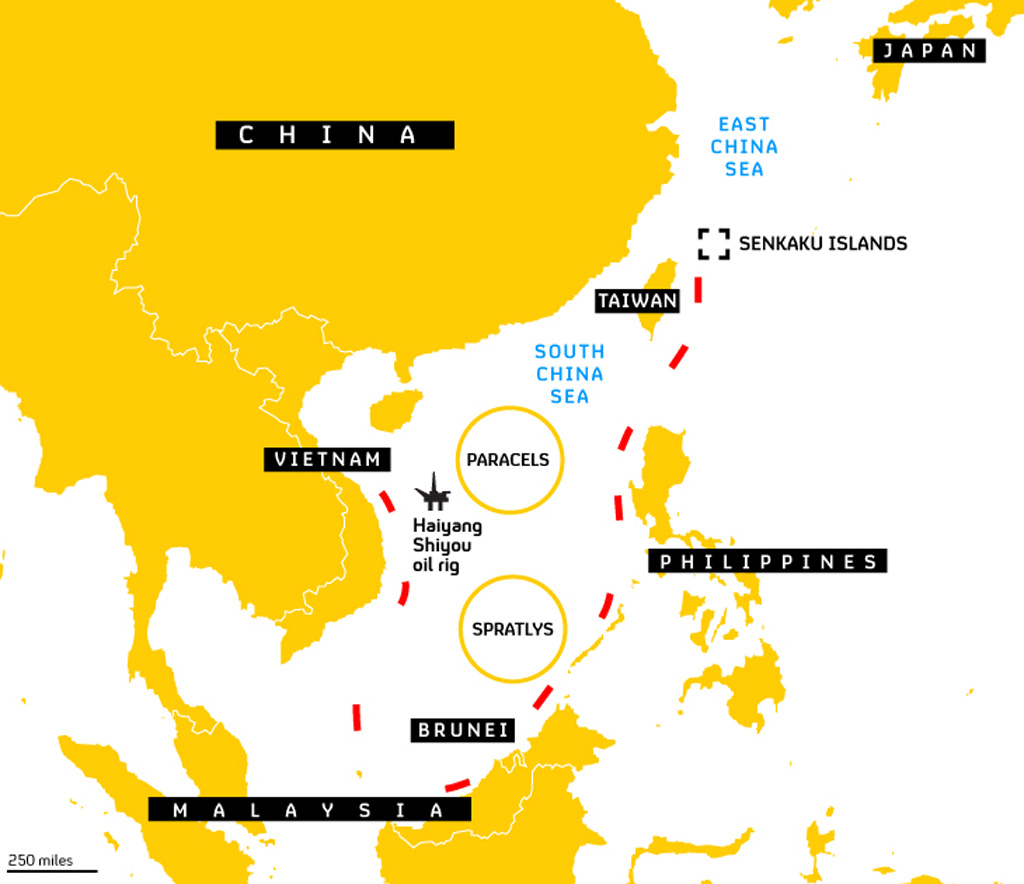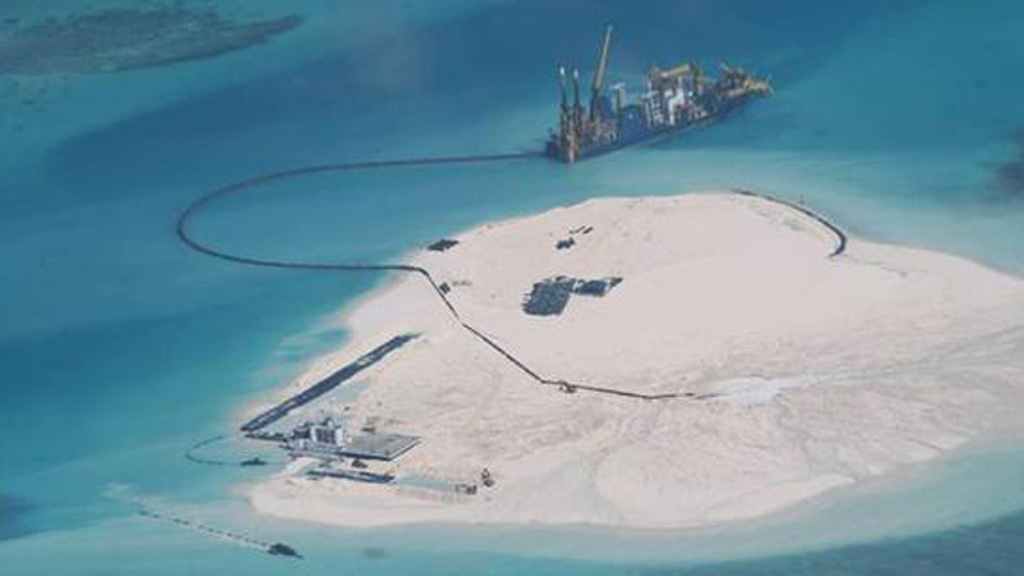Why the South China Sea is the latest global flashpoint
While the world’s eyes are on Russia, its ally China continues to clash with neighbouring countries over competing claims to the oil-rich South China Sea. Will there be war?
At least 21 people are believed to have died in anti-Chinese riots in Vietnam. Violent mobs attacked Chinese and Taiwanese-owned businesses after Beijing placed an oil rig in the South China Sea near Vietnam.
It is the latest incident in a region that is becoming increasingly volatile, as China’s territorial claims over vast swathes of the sea put the superpower on collision course with its neighbours.
In recent days the US, Japan and the Philippines have also weighed into the growing crisis.
Vietnam standoff
The anti-Chinese violence in Vietnam is a reaction to the presence of a Chinese deepwater oil rig – Haiyang Shiyou 981- in the western part of the South China Sea inside what Vietnam says is its territorial waters.
Vietnam has asked its fellow Communist neighbour to suspend drilling, and has sent coast guard vessels to patrol the area.
TV footage has emerged purportedly showing Chinese vessels using water cannon and ramming Vietnamese ships near the rig at the weekend. China says the drilling is taking place inside Chinese territory and says it has acted with “restraint”.
US Secretary of State John Kerry called China’s actions “provocative” and “aggressive” while Chinese Foreign Minister Wang Yi urged Kerry to “speak and act cautiously”.
Anti-Chinese rioting has seen dozens of deaths and incidents of arson and looting, with hundreds of Chinese expats fleeing the country.
The violence marks a recent low point for Sino-Vietnamese relations. In 1988 a skirmish with Chinese forces over control of the disputed Spratly islands led to the deaths of more than 60 Vietnamese soldiers.
The two countries fought a brief border war in 1979 after Vietnam toppled the Beijing-backed Khmer Rouge regime in Cambodia.

The cow’s tongue
China says it has “indisputable sovereignty” over the islands in the South China Sea and their adjacent waters, including the large Paracel and Spratly archipelagoes, citing historical occupation.
Official maps use a series of ten dashes to mark China’s vast territorial claim, sometimes called the “cow’s tongue” by China-watchers, although the legal status of the claim is unclear.
But Vietnam, the Philippines, Taiwan, Malaysia and Brunei all lay claim to various territories in the South China Sea too.
The area is rich in natural resources and fish. And despite the presence of many low-lying islands and reefs, leading to sailors referring to a large swathe of the sea as “the Dangerous Ground”, it is also the world’s second busiest trade route.
The US Energy Information Administration estimates there are about 11 billion barrels of oil and 190 trillion cubic feet of natural gas under the ocean floor.
China says it has the right to drill for oil close to Vietnam because the rig is close to the Paracel islands and therefore inside its territorial waters.
Vietnam says the installation is within 200 nautical miles of the Vietnamese coast and therefore within the exclusive economic zone prescribed by the United Nations Convention on the Law of the Sea.
Other hotspots
China has asserted its territorial claims in various parts of the region more aggressively in recent years.

The Philippines government this week released photographs of what it said were Chinese installations built on reclaimed land in a part of the Spratly Islands also claimed by Manila.
It said the structures violate the 2002 Declaration on the Conduct of Parties in the South China Sea, in which China and the ASEAN countries agreed to “exercise self-restraint in the conduct of activities that would complicate or escalate disputes” in the region.
Ignorance of China’s resolve to defend its sovereign land will induce consequences too severe for certain countries to bear. Xinhua article
Last week Philippines police arrested a group of Chinese fishermen in waters claimed by China. A strongly-worded comment article issued by its state-run Xinhua news agency said China “is confident and capable of countering challenges to its territorial and sovereign integrity”.
It added: “All parties should also be reminded that ignorance of China’s resolve to defend its sovereign land will induce consequences too severe for certain countries to bear.”
On Thursday Philippine and US forces conducted live fire exercises, the first war games under a new security pact between the two countries.
In the East China Sea, the long-running dispute between Japan and China over the Senkaku or Diaoyu islands took an ominous turn when the Japanese Prime Minister Shinzo Abe called for a review on the legal limits prohibiting the country’s ability to fight overseas.
Mr Abe said it was time to look again at Japan’s pacifist postwar constitution, which bans Japanese forces from exercising its right of collective self-defence or sending military aid to friendly countries.
Boiling point?
While some commentators have compared the rising tension in Asia to the powder keg politics of Europe in 1914, others say China and the US – which announced a renewed interest in the region in the “Asian pivot” of 2011 – are too pragmatic to let the situation descend into full-scale war.
Christian Le Mière, a senior fellow at the International Institute for Strategic Studies, told us there is “the possibility of limited skirmishing and conflict”, but a wider conflict involving the United States was unlikely.
They fear a conflict breaking out which they don’t wish to see. Christian Le Mière
China has been careful to use lightly armed coastguard vessels rather than navy ships to enforce its territorial claims, he noted, adding: “They fear a conflict breaking out, which they don’t wish to see.”
And while the US sees China as a “a potential rival and even a potential violent competitor”, it has mostly refused to take sides in the bitter territorial disputes that rage across the region.
-
Latest news
-
Windrush scandal: returning to the UK after a forty year wait6m

-
Netanyahu ‘survival’ depends on ‘expanding war’ says head of Palestinian National Initiative5m

-
Proposed law change could strip parental rights from paedophiles5m

-
Hugh Grant settles privacy lawsuit against The Sun newspaper publisher2m

-
Post Office Scandal: what did top executive know?6m

-




